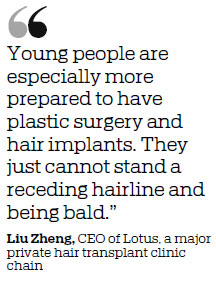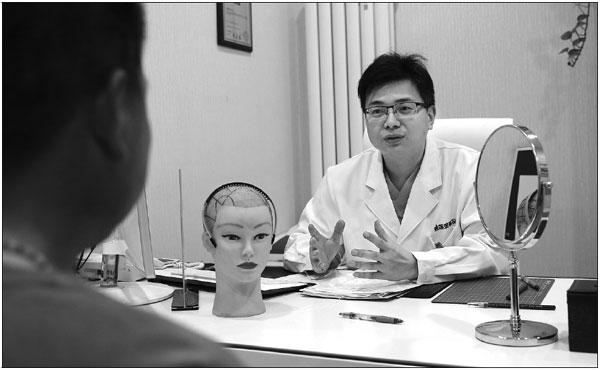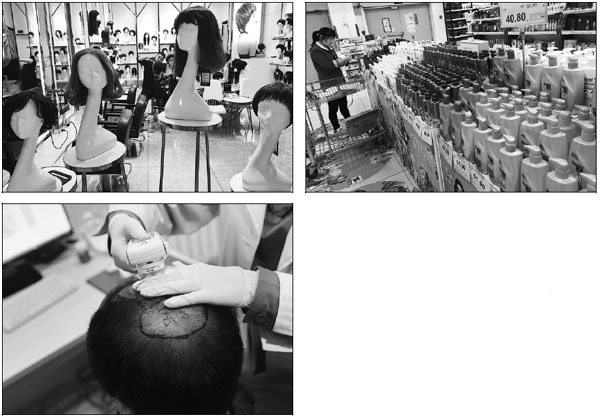Young Chinese troubled by hair loss
Problem has become one of their top health concerns
A post on WeChat asking for volunteers troubled by hair loss to take part in an experimental program for a growth product produced dramatic results.
The post, by the cosmetics evaluation center of West China Hospital in Sichuan province, stated that anyone from 18 to 60 years old was welcome to apply to take part in the program.
Those who were accepted were asked to use the hair growth product for 28 days and to return to the center every Friday for follow-up inquiries for four consecutive weeks.
|
Zhang Pengcheng, a doctor from Lotus, a major private hair transplant clinic chain, tells a patient how to care for his hair after surgery. Wang Zhuangfei / China Daily |
|
Clockwise from above left: Wigs are displayed at a shop in Beijing; sales of shampoo claiming to boost hair growth rose by 136 percent year-on-year in the first quarter of last year, figures from major online shopping platform JD show; a doctor from Lotus carries out a check before performing a hair implant procedure. Photos by Wang Zhuangfei / China Daily |
Within a day, the post had been read 62 million times. More than 8,000 people sent registration information to the WeChat account, despite the center wanting only 30 volunteers, and it took just 20 minutes for it to hire sufficient recruits after the post appeared, according to media reports.
In addition, more than 700 people answered a questionnaire to be included in the center's volunteer database, giving them precedence over others to take part in trials of similar products.
"Hairloss" is an internet buzzword. Surveys show the condition has become one of the top concerns for young Chinese, who are losing their hair earlier than before.
In 2011, a survey by the China Association of Health Promotion and Education found that about 200 million Chinese, including some 130 million males, were troubled by hair loss.
The main age group experiencing the problem was 20 to 40 years old, the survey found. It predicted that 260 million Chinese would encounter hair loss in 2016.
Among males 20 to 40 years old, about one in four had some degree of hair loss. In addition, men in their 30s were losing their hair faster than any other age groups, the survey found.
Despite the lack of similar national surveys on hair loss problems among Chinese in recent years, statistics from various sources have indicated that the problem is becoming even more frustrating for many young people, especially men.
Hair loss is now among the top health concerns for Chinese, ranking fifth, after bad skin, depression and anxiety, bad sleep, and digestive tract discomfort and illness, according to a report on the overall health of Chinese. The report was jointly released early this year by DXY, a leading online healthcare platform, and Health News, a national publication focusing on pharmaceuticals and healthcare.
The survey had 50,000 respondents, and 27 percent said they had experienced hair loss. Among those born in and after 1990, 31 percent said they had the problem.
Women tend to feel more pressure from hair loss. Some 19 percent of male respondents said they were becoming "upset" about the problem, while 30 percent of women said so, the report said.
"Hair loss" is frequently searched online, with Chinese netizens often inquiring about prevention and treatment on healthcare service platforms, the report said.
A report by AliHealth, the health and medical unit of the Alibaba Group, concluded that those born in and after 1990 are becoming one of the major age groups experiencing the problem.
Just over 36 percent of users searching for and buying anti-hairloss products on Alibaba's online shopping platforms last year were born in and after 1990, and 38.5 percent were born between 1980 and 1989. Meanwhile, 80 percent of the searchers were males, the report said.
Wang Wenhui, a senior dermatologist with Peking University Third Hospital, a leading general hospital, said most of her hair loss patients are young people.
She said this is mainly because young people care more about how they look than those who are older, and also because young people, especially those living in first-tier cities, often have fast-paced lifestyles and are more likely to be under pressure.
She said hair loss can result from heredity, diseases, medication and unhealthy lifestyles. Stress, staying up late, insomnia and dieting, among many other factors, are the main lifestyles that can cause and aggravate the condition.
Lifestyles such as these will disrupt the normal cycle of hair growth, resulting in more hair loss, Wang said, adding that a lack of nutrients, which may affect women who are dieting, also impairs hair growth.
Hereditary hair loss often increases with age and is frequently characterized in men by a gradually receding hairline from the forehead and loss of hair on the top of the head. Women experience widening of the central parting with the hairline at the front of the head remaining, Wang said.
"It is common for a person to lose about 100 hairs a day. If they are losing more than 200 to 400 a day, they should be on the alert," she said.
Healthy lifestyles and relaxation are very important precautions against hair loss, and treatments depend on different causes, which include hormone-related medications, nutrient supplements and hair transplantation, Wang said.
With young people experiencing hair loss, the treatment market is flourishing.

According to a report by Shenwan Hongyuan Securities in Shanghai, about 66 percent of Chinese males with hair loss want the problem treated. Among the high-income group, the proportion is 86 percent.
The amount on average people are willing to pay for this treatment is 5,000 yuan ($745), while some are prepared to pay 30,000 to 50,000 yuan.
China's hair implant market reached 1 billion yuan in 2013, sales of wigs reached 3 billion yuan, and those of related shampoos 23 billion yuan, the report said. It emphasized that the treatment industry is very promising in China, as the proportion of people losing their hair has risen from 15 percent to 18 percent annually.
The market has witnessed even faster growth more recently.
Figures from major online shopping platform JD show that sales of shampoos claiming to boost hair growth rose by 136 percent year-on-year in the first quarter of last year.
Tmall, Alibaba's e-commerce platform for established brands, said its sales of anti-hair-loss products rose by 100 percent last year.
Market research company iResearch said in a report last year that China's hair implant market in 2017 was 9.2 billion yuan, year-on-year growth of more than 100 percent.
Liu Zheng, CEO of Lotus, a major private hair transplant clinic chain, said industry insiders believe the country's hair implant industry has already exceeded 10 billion yuan, and that within five to 10 years the market size will be 50 to 100 billion yuan.
The company has more than 30 clinics nationwide, including first-tier cities and most provincial capitals, and its revenue has risen by 60 percent annually in recent years.
"As people's living standards continue to rise, they are willing to spend more on their looks; a reflection of the ongoing consumption upgrade," Liu said.
"Young people are especially more prepared to have plastic surgery and hair implants. They just cannot stand a receding hairline and being bald."
He said most of Lotus' clients are 20 to 35 years old, adding that with the devices and technologies that have been developed domestically, hair implantation is a relatively safe procedure when performed by qualified surgeons in certified facilities.
In addition, despite men being more likely to experience hair loss than women, and about 80 percent of the chain's clients being males, the number of female customers is rising fast, mostly for treatment of receding hairlines, Liu said.
A Beijing resident born in 1991, who asked to be identified as Xiao Liu, said he is very happy he had hair implantation surgery.
He often stayed up late, and noticed a relatively heavy hair loss in 2013 when he was a sophomore at Zhengzhou University, Henan province. Xiao resorted to various remedies, including medication and shampoos.
After graduation, he became a programmer for a well-known internet company, which paid well but there was a heavy workload and pressure.
Working late became commonplace, along with hair loss. Xiao noticed that many colleagues had receding hairlines, and some had even gone bald.
In 2017, three years after graduation, he decided to have a hair implant.
He spent two months researching information online and comparing prices, reputation and certification, before narrowing his choice to a private clinic, where he spent 34,000 yuan on the procedure.
Waiting lines at public hospitals were too long, and the clinic he chose gave him a good discount and promised a refund if the surgery failed, he said.
However, Liu, the Lotus CEO, said that as demand for hair implants has surged, many unqualified service providers are joining the industry, while some private clinics spend too much money on advertising, instead of day-to-day operations, which is harmful for the industry's long-term development.
Xiao, the customer, said he found that some self-professed hair implant surgeons were not even qualified doctors - a basic requirement by the health authorities. Some clinics claimed to have reputable surgeons and skillful staff members, when they did not.
liuzhihua@chinadaily.com.cn
(China Daily 04/24/2019 page1)




















